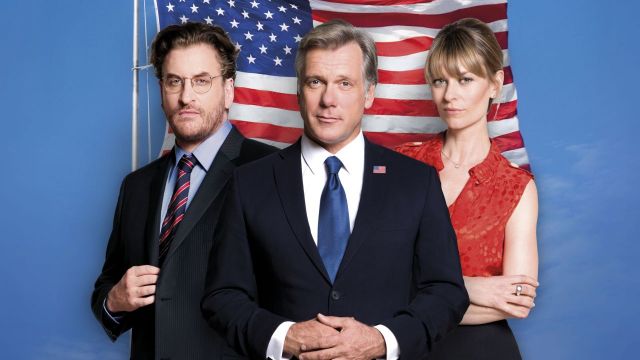New Comedies On The Move
Two seriously comic new plays feature characters on the move — by presidential jet plane or by cruise ship. FRANK HATHERLEY talks to their very grounded directors. In Melbourne, the director is working with three first-time playwrights. In Sydney, the director is working with Australia’s most successful playwright: himself.
Sam Strong, at 37, has directed very many new Australian plays. “I grew up theatrically”, he says, “directing new work at all the usual Melbourne independent venues.”
Then he went to Sydney, specialising in new plays at the Belvoir and as Artistic Director of the Griffin Theatre Company.
Now, “as a sort of prodigal son”, he has returned to Melbourne as Associate Artistic Director of the MTC, and is about to start rehearsals on a particularly challenging new project.
Melbourne-based production company Working Dog is famous for the phenomenally successful comic movie The Castle (1997) and a string of television successes, including Frontline (94-97).
Now their three top collaborators — Santo Cilauro, Tom Gleisner and Rob Stitch — have jointly written their first-ever stage play, a wild political comedy set on a jet plane. But not any old jet: this is Air Force One, the self-contained administrative headquarters of the US President.
“The Speechmaker has a great starting point or conceit,” says Strong with maximum enthusiasm. “You have a fictional president on the way to London on a surprise visit which is interrupted by a terrorist threat, and then chaos and humour and drama ensue.”
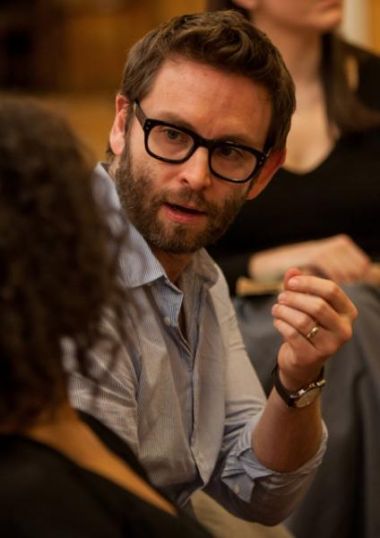
The Working Dog team may be new to writing for the stage but, their director says, “they are
great story tellers, and the ability to tell great stories transcends the medium in which they’re told.
“It’s my job to use all the experience I have in directing new plays to bring this work into the theatre.
“In my experience the most successful examples of the development and direction of new plays has been the result of the people involved being agile and courageous, and being willing to change.
“The moment at which a new play – and particularly a new comedy – first encounters an audience is a really vital point in its development. It’s a foolish director who isn’t willing to make quite large changes on the basis of how the work’s faring in previews.”
I tell him about my discussions with the creators of recent new musicals, how they all had to face ‘killing their babies’, maybe their most loved song or scene, for the good of the whole.
Sam Strong agreed immediately. “The straight play equivalent — especially with comedy — is not being too attached to particular jokes. It might be a good gag or a particularly smart line, but in the broader interests of the story you are telling it can be necessary to sacrifice it.
“But I don’t suspect we’ll be making massive change to The Speechmaker because it’s in pretty good shape already. It struck me that all of those trademark Working Dog qualities – the wit, the intelligence, the humour – had been seamlessly transposed into a theatrical context.
“With Santo, Tom and Rob it’s like getting three brains for the price of one. You see how they comically bounce off one another and generate ideas. I’m on the receiving end of the comic and satiric gold that comes from their lengthy collaboration.”
MTC’s Artistic Director Brett Sheehy says this production fulfils his hopes “to bring people [who are] writing for film and television into the theatre world”.
Later in the year Brendan Cowell’s football play The Sublime is also “expected to reach audiences beyond the MTC’s traditional subscriber base.”
“Getting a new audience in is something that always excites me as a director,” says Strong. “The Speechmaker will satisfy a traditional theatre-going audience. And I think it will bring in people who haven’t been to the theatre before but who know Working Dog’s consistently brilliant screen work.
“It’s funny, it’s witty, it’s satiric, and it’s asking big questions about American politics and the ethics of our leaders.”
***
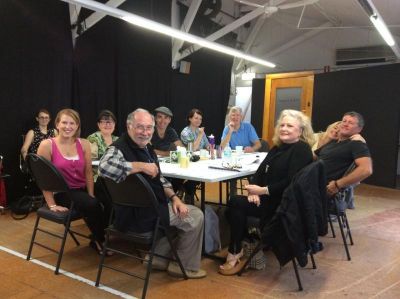 Over in Sydney, David Williamson is running late after a packed Easter weekend with “the world’s liveliest grandson”. He takes my call while striding across the Harbour Bridge. He does this not unchallenging walk twice a day between his apartment in The Rocks on the south side and the Ensemble Theatre on the harbour’s edge in Kirribilli on the north side.
Over in Sydney, David Williamson is running late after a packed Easter weekend with “the world’s liveliest grandson”. He takes my call while striding across the Harbour Bridge. He does this not unchallenging walk twice a day between his apartment in The Rocks on the south side and the Ensemble Theatre on the harbour’s edge in Kirribilli on the north side.
“Walking is the only exercise you get when you’re directing a play,” he says, raising his voice above the constant roar of traffic.
At the Ensemble he’s directing Cruise Control, his own new play. It’s this fit, bridge-walking 72-year-old’s 52nd play, an achievement unequalled in the history of Australian theatre.
“I have directed my own plays before,” he says, “but not often. I did Lotte’s Gift at the Ensemble a few years back [2007]; I did Sons of Cain for the MTC and the STC in the 80s [1985]. I do enjoy it, but frankly I haven’t had enough time to contemplate directing much.
“One of the real benefits of directing my own play is that I can continually fine-tune the script day by day as we go along, mainly in the form of cuts, streamlining, adding a few more lines here and there as difficulties become apparent. It’s been a very good exercise in getting the script to its tightest possible level.”
Cruise Control was inspired by real events.
“My wife Kristin and I took a cruise three years back on a big luxury ocean liner [the Queen Mary II] on a historic journey from London to New York. It went right over the spot where Titanic sunk.
“We didn’t realise that, unless you booked very early, you couldn’t sit at a table with just your partner.
“You had to share a table with six or eight people, and those people are randomly assigned to you, and you have to be with them for the whole seven nights of the voyage because if you don’t turn up at your table you don’t get fed.
“About six months after the cruise I thought, well, that’s a fertile arena for drama. I chose three couples who most definitely do not get on with each other so things go from bad to worse, which is good drama and allows good comedy to arise.”
We talk about the difficulties and differences in creating new theatre works — plays and musicals.
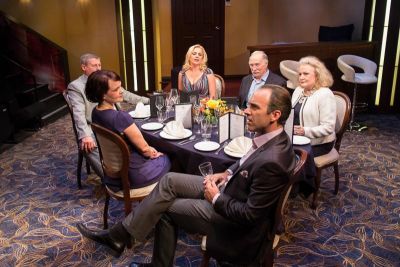
“You can’t do wholesale rewriting during the rehearsal period for a new play. If the script isn’t almost in the final stage it’s just too much of a strain for the actors.
“These days a theatre company will give me a reading four to six weeks before the first rehearsal.
“It’s only when you hear the actors do the reading that you realise some lines aren’t necessary, or you’ve said the same thing twice, sometimes three times. So we’ll all discuss it, and then I’ll go away and think about it and rewrite. That works well for me.”
In fact, Williamson now insists on it.
“I’ve done some tinkering with just about all my plays,” he projects above the bridge traffic, before adding ruefully, “maybe with some of them I should have tinkered a bit more.”
Is it difficult to cut lines or moments or jokes that you’re really fond of?
“No, no, if the lines aren’t working I’m the first to cut them. Sometimes an actor might say ‘oh, please, don’t cut them!’ but usually they totally agree. They don’t want to be left with egg on their face quoting bad or redundant lines.
“I’ve never regarded myself as a gag writer. The comedy in my plays comes from the audience recognising that characters are behaving badly without realising it. Comedy is really about bad behaviour that is not apparent to the characters but is apparent to the audience.
“I’ve been dissatisfied with productions that have treated my plays as ‘comedies’ and gone hunting for laughs. Directing this play, I’ve been able to insist on the dramatic truth.”
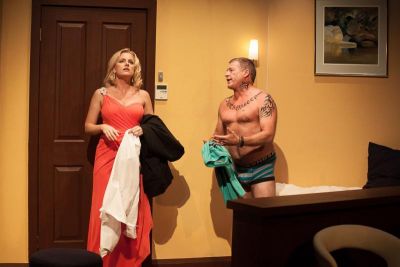 Would his system apply equally to new musicals?
Would his system apply equally to new musicals?
“Musicals are notorious for shaping, polishing, shaping, polishing, getting rid of songs, bringing new ones in. Mind you, sometimes the producers are totally wrong. Over the Rainbow was very nearly cut from the Wizard of Oz movie because the producers thought it was a dud song.
“Far too many directors of new musicals think that they can dispense with writers, whose special skill, after all, is to shape and craft and avoid redundancies. It’s the same with movies. I think many Australian movies are forgettable because the director is also the writer.
“Let’s hope that doesn’t happen to me with Cruise Control,” he laughs.
“Mind you, I think it’s more dangerous with directors becoming writers than with writers becoming directors, because writers actually know about structure, about what works and what doesn’t, about what’s redundant and what isn’t.”
The Speechmaker by Santo Cilauro, Tom Gleisner and Rob Sitch. Melbourne Theatre Company and Working Dog Productions. Playhouse, Arts Centre Melbourne - 5 June to 5 July 2014.
Cruise Control by David Williamson. Ensemble Theatre, Sydney. 30 April to 14 June 2014 (Ensemble season sold out. Additional performances at The Concourse, Chatswood - June 23 - June 25).
Images: The Speechmaker; Sam Strong; David Williamson and the cast of Cruise Control at the first reading; and Cruise Control production images by Clare Hawley - Peter Phelps, Michelle Doake, Helen Dallimore, Henri Szeps, Felix Williamson and Kate Fitzpatrick & Helen Dallimore and Peter Phelps.
Originally published in the May / June 2014 edition of Stage Whispers.
Subscribe to our E-Newsletter, buy our latest print edition or find a Performing Arts book at Book Nook.

